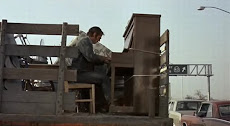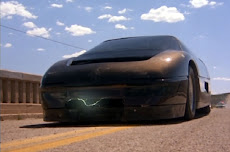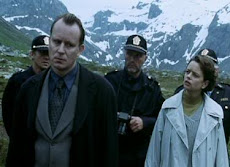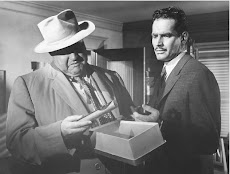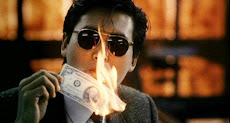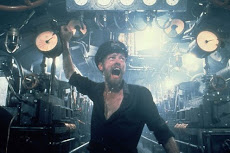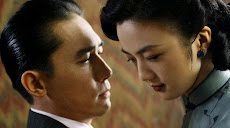Just one month before Charlie Sheen launched his A-List leading-man career in Platoon (and a year before sealing the deal with Wall Street), he was greatly angering one already stern-looking Nick Cassavetes, wooing a perfect 10 Sherilyn Fenn*, giving Clint Howard a chance to show off that pre-total-bald-dome white-dude 'fro, and otherwise letting Randy Quaid enjoy a well-deserved break between his busy National Lampoon's _____ Vacation schedule.
In the mid-1980s southwest U.S., a band of hooligans runs the highways. Led by Packard Walsh (Cassavetes), they prey upon unsuspecting teens in sports cars (that is, what passed for sports cars in the 1980s) and force them to race. "If you lose the race, you lose your car!" The legal technicalities of gaming law and contract law aside, this allows for the hooligans to keep the losing car fair and square. And before you write this off as "boys will be boys," please note: the hooligans cheat when they race.
 Packard isn't just a sociopath on the road, he's also got problems communicating. When Keri Johnson (Fenn) rejected his advances in favor of her boyfriend Jamie (Sheen, but played by Christopher Bradley in flashbacks), Packard killed Jamie with the help of his gang. Keri has nearly recovered from the horrific episode, but just as Packard seems to be settling in as king of the Arizona backdesert, a mysterious Jake (Sheen) arrives in town, quickly putting the moves on Keri and wooing her in ways Packard cannot muster due to his salty disposition.
Packard isn't just a sociopath on the road, he's also got problems communicating. When Keri Johnson (Fenn) rejected his advances in favor of her boyfriend Jamie (Sheen, but played by Christopher Bradley in flashbacks), Packard killed Jamie with the help of his gang. Keri has nearly recovered from the horrific episode, but just as Packard seems to be settling in as king of the Arizona backdesert, a mysterious Jake (Sheen) arrives in town, quickly putting the moves on Keri and wooing her in ways Packard cannot muster due to his salty disposition.About the same time as Jake's arrival, a mysterious , futuristic car appears to challenge the hooligans. One by one, this car-- this wraith-- exacts certain death on the gang members involved in Jamie's death. Sheriff Loomis (Quaid),
 mysteriously absent any time Packard is stealing cars via street racing or until after the Wraith has claimed a victim, pieces together the solution to the riddle at a distance. He is the one bulwark of wisdom among the premium-fueled, deadly adolescence.
mysteriously absent any time Packard is stealing cars via street racing or until after the Wraith has claimed a victim, pieces together the solution to the riddle at a distance. He is the one bulwark of wisdom among the premium-fueled, deadly adolescence.The Wraith, in addition to my previous jabs in the plot summary, is largely an amalgamation of a soundtrack featuring Billy Idol and other '80s hair, physics that allows four-banger Dodge Daytonas to keep up with supposedly supercharged Corvettes, and a rather meandering plot connecting frivolous action sequences between scenes of country bumpkins like Sheriff Loomis standing around just letting the Wraith do his business with looks of deep contemplation. There's also some serious drug abuse (of the "huffing" variety, if I recall my D.A.R.E. education correctly) by two of the holligans, aptly named "Skank" and "Gutterboy."
Did I already say "Sherilyn Fenn?"
One element is certainly nostalgia. When I was growing up in the early 1990s, Wraith was often shown as a Saturday afternoon movie on TV, but I always caught it at the half way point. Even upon reaching college, The Wraith did not get a DVD release until well into the 2000s. Even then, it was bundled together with The Gate, some Trick-or-Treat movie with Ozzy Osborne and at least one other movie I certainly wasn't going to watch. (For the record: a Special Edition of the Wraith was finally released on DVD in March 2010.) Does my quest to see The Wraith in its entirety suggest that the film represents not so much a destination, but a long fond journey? Well, maybe so. Maybe so.
In actuality: this movie is fun. The Wraith was not the first or last cobbled-together story with young actors of varying talent that was considered by producers a success if it just brought in a few hundred thousand profit (which it did, holla), but it has some gems. Rip on Billy Idol all you want, but the music works to the pent-up teen angst and especially for car races. The special effects are actually quite stellar for a $2.7 million movie-- and still look pretty good today. The Wraith car itself is pretty stinkin' cool, and the writers do not attempt to explain Jamie / Jake's resurrection-- he's just there. Just the right aura of mystery, unconcerned with confusing the audience that might want to know everything.
I love The Wraith. There, I said it.
*"Marry me, Sherilyn Fenn circa 1986" almost equals "Marry me, Grace Kelly circa 1954."




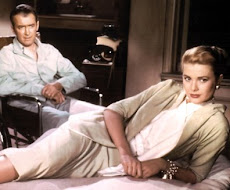_01.jpg)



